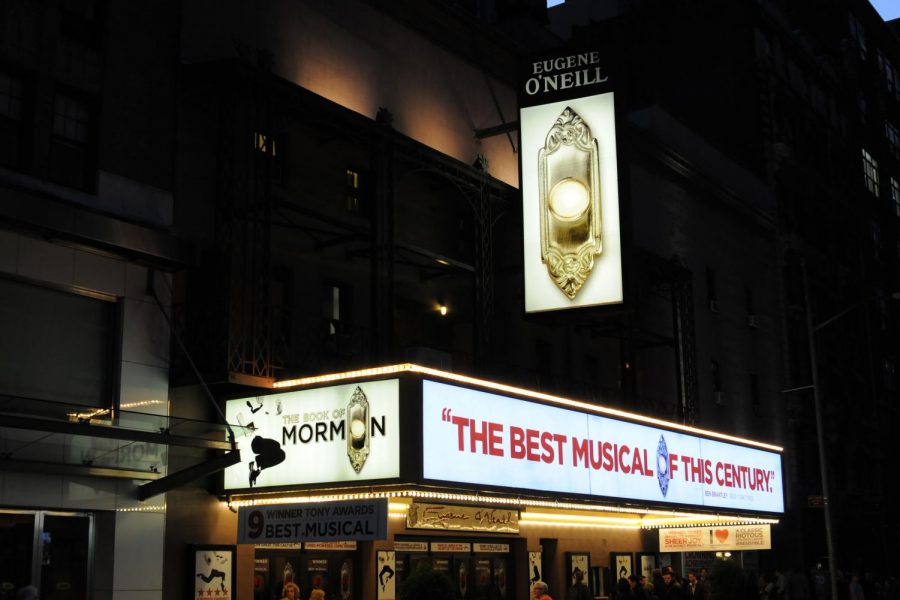‘The Book of Mormon’ Will Increase Your Faith in Good Musical Theater
August 23, 2019
Less than two blocks away from the Salt Lake Temple, there’s now another landmark to Utah’s most famous faith. Although one allows far more four-letter words than the other, both are sure to inspire some unwavering devotion.
“The Book of Mormon,” which is playing at the Eccles Theatre until Aug. 25, is uniquely suited for Salt Lake audiences. This is the third time the national tour has visited Utah. The musical follows Elder Price (Liam Tobin), a picture-perfect missionary for the Church of Jesus Christ of Latter-day Saints. Elder Price is sure that Heavenly Father will reward his devotion with a mission to his favorite place in the world — Orlando, Florida. His time at the Missionary Training Center, however, ends with two devastating blows — he is sent to teach in Uganda and his missionary companion will be Elder Cunningham (Jordan Matthew Brown), a “Star Wars”-loving misfit who masks his social awkwardness with increasingly imaginative lies.
When the Elders arrive in Uganda, they are shocked to learn that the other missionaries have not baptized a single person. While Elder Cunningham is drawn to a local young woman named Nabulungi (Alyah Chanelle Scott, who plays her as a sweet and salty ingénue), Elder Price faces increasingly dramatic challenges to his faith.
To reveal much more would spoil the many delightful details that both extend and subvert this musical’s premise. Most Utah audience members have already heard a New Testament’s worth of Mormon jokes, but the show — written by “South Park” creators Trey Parker and Matt Stone with EGOT wunderkind Robert Lopez — constantly finds surprising avenues for satire. Take, for example, the song “Baptize Me,” which compares baptism and loss of virginity with some truly inspired double entendres, or “Spooky Mormon Hell Dream,” which takes religious guilt to surreal, Starbucks-suffused extremes. “The Book of Mormon” might be the most explicit mainstream musical in history, but there is real cleverness and craft behind the vulgarity.
Plenty of disparate musicals released this decade, from “Something Rotten” to the film adaptation of “Annie” to the TV series “Crazy Ex-Girlfriend,” have skewered musical theater tropes by breaking the fourth wall. This trend, which usually points out the ridiculousness of suddenly breaking into song, can be used effectively, but it has recently grown tiresome and oddly defensive as if the creators are self-conscious of their own genre.
“The Book of Mormon” has a near endless stream of jokes — filthy, sublime, provocative, juvenile ones — but it never tips its hand or winks at the audience. In all the best ways, “The Book of Mormon” is a deeply traditional musical. The show is, unironically, a tightly structured and smartly plotted musical comedy, with catchy songs and tap dancing to boot. Casey Nicholaw’s choreography would fit in at kingdoms both Magic and Celestial. All the while, it both parodies and embraces decades of musical theater tradition, from “Annie” to “Fiddler on the Roof” and “The Lion King” to the Hill Cumorah Pageant.
“The Book of Mormon” genuinely loves musicals, and it gives you plenty of reasons to love them too. While some of the songs rely on shock value, the most memorable moments are as emotionally evocative as they are gut-bustingly funny. While listening to “Sal Tlay Ka Siti,” a perfectly constructed “I want” song, or “I Believe,” which sneakily both celebrates and satirizes the power of faith, I didn’t just laugh at the jokes — I felt something like the Holy Ghost.
Some of the less sincere moments turn into the show’s few missteps. This musical’s portrayal of Uganda may even be less flattering than its opinions of organized religion. The treatment of race in “The Book of Mormon” sometimes borders on queasy, especially when watching with an almost entirely white audience. Parker, Stone and Lopez leave no sacred cow un-slaughtered, and the darkest jokes, which cover everything from AIDS to genital mutilation, can occasionally curdle into mean-spiritedness. Maybe the musical is less equipped for a post-Trump world, where any screed against political correctness feels more petulant than transgressive.
Still, the show mostly manages to pull off even the most perilous subject matter with enviable ease. It helps that, in one of the show’s most subtle and risky bits of satire, the audience often sees the Ugandans through the same lens as the missionaries, a virgin cocktail of good intentions and ignorance.
Speaking of which, The Church’s response to the musical has been notably muted. Their strategy — which at one point included advertising in the playbill — is actually brilliant. They appear in on the joke, avoid the pesky Streisand Effect and, weirdly, take advantage of a missionary opportunity. Josh Gad, who originated the role of Elder Cunningham, claimed that some audience members “were so moved by the show they took up the Mormon faith.”
I’m not convinced any of the Salt Lake natives who saw this musical will have a change of heart, but “The Book of Mormon” renewed my faith in the possibilities of inventive, entertaining musical theater. Really, there is so much the show gets right that I barely mentioned, from the charming, inexhaustible ensemble — luckily for casting directors, the physical Venn diagram between stereotypical Mormon missionaries and handsome theater twinks closely resembles a circle — to the rousing, joyous final number. By then, I had lost count of how many ways “The Book of Mormon” won me over. I just believed.







